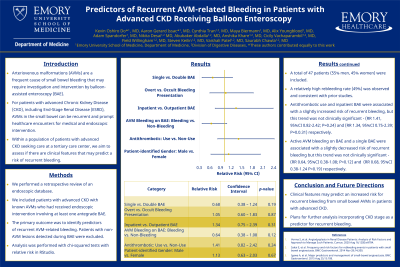Monday Poster Session
Category: Small Intestine
P2636 - Predictors of Recurrent AVM-Related Bleeding in Patients with Advanced CKD Receiving Balloon Enteroscopy
Monday, October 23, 2023
10:30 AM - 4:15 PM PT
Location: Exhibit Hall

Has Audio

Kevin O. Do, MD
Emory University School of Medicine
Atlanta, GA
Presenting Author(s)
Kevin O. Do, MD1, Aaron Issac, MD1, Cynthia N. Tran, MD1, Maya Biermann, MD2, Alix Youngblood, MD1, Adam Spandorfer, MD2, Nikita Desai, MD1, Abubaker Abdalla, MD1, Anshika P.. Khare, MD1, Cicily Vachaparambil, MD2, Field Willingham, MD, MPH2, Steven Keilin, MD1, Vaishali Patel, MD1, Saurabh Chawla, MD, FACG1
1Emory University School of Medicine, Atlanta, GA; 2Emory University, Atlanta, GA
Introduction: Arteriovenous malformations (AVMs) are a frequent cause of small bowel bleeding that may require investigation and intervention by balloon-assisted enteroscopy (BAE). For patients with Chronic Kidney Disease (CKD) at advanced stages, including End-Stage Renal Disease (ESRD), these small bowel lesions can be recurrent and prompt healthcare encounters for medical and endoscopic intervention. Within a population of patients with advanced CKD seeking care at a tertiary care center, we sought to assess if there are clinical features that may predict a risk of recurrent bleeding.
Methods: We performed a retrospective review of an endoscopic database. We included patients with advanced CKD with known AVMs who had received endoscopic intervention involving at least one antegrade BAE. The primary outcome was to identify predictors of recurrent AVM-related bleeding. Patients with non-AVM lesions detected during BAE were excluded. Statistical analysis was conducted in RStudio.
Results: A total of 47 patients (55% men, 45% women) were included. Recurrent bleeding occurred in 23 patients (49%). No significant associations were revealed amongst gender (RR 1.13, 95%CI 0.63-2.03; P=0.67) and clinical features of antithrombotic use (RR 1.41, 95%CI 0.82-2.42; P=0.24), AVM bleeding on BAE (RR 0.64, 95%CI 0.38-1.08; P=0.12), inpatient versus outpatient BAE (RR 1.34, 95%CI 0.75-2.39; P=0.0.31), overt versus occult bleeding presentation (RR 1.05, 95%CI 0.60-1.83; P=0.87), and single versus double BAE (RR 0.68, 95%CI 0.38-1.24; P=0.19) and risk of recurrent AVM-related bleeding.
Discussion: Despite prior studies indicating an association between the aforementioned clinical features and risk of recurrent bleeding or BAE, this was not demonstrated in our study involving patients with advanced CKD.
Disclosures:
Kevin O. Do, MD1, Aaron Issac, MD1, Cynthia N. Tran, MD1, Maya Biermann, MD2, Alix Youngblood, MD1, Adam Spandorfer, MD2, Nikita Desai, MD1, Abubaker Abdalla, MD1, Anshika P.. Khare, MD1, Cicily Vachaparambil, MD2, Field Willingham, MD, MPH2, Steven Keilin, MD1, Vaishali Patel, MD1, Saurabh Chawla, MD, FACG1. P2636 - Predictors of Recurrent AVM-Related Bleeding in Patients with Advanced CKD Receiving Balloon Enteroscopy, ACG 2023 Annual Scientific Meeting Abstracts. Vancouver, BC, Canada: American College of Gastroenterology.
1Emory University School of Medicine, Atlanta, GA; 2Emory University, Atlanta, GA
Introduction: Arteriovenous malformations (AVMs) are a frequent cause of small bowel bleeding that may require investigation and intervention by balloon-assisted enteroscopy (BAE). For patients with Chronic Kidney Disease (CKD) at advanced stages, including End-Stage Renal Disease (ESRD), these small bowel lesions can be recurrent and prompt healthcare encounters for medical and endoscopic intervention. Within a population of patients with advanced CKD seeking care at a tertiary care center, we sought to assess if there are clinical features that may predict a risk of recurrent bleeding.
Methods: We performed a retrospective review of an endoscopic database. We included patients with advanced CKD with known AVMs who had received endoscopic intervention involving at least one antegrade BAE. The primary outcome was to identify predictors of recurrent AVM-related bleeding. Patients with non-AVM lesions detected during BAE were excluded. Statistical analysis was conducted in RStudio.
Results: A total of 47 patients (55% men, 45% women) were included. Recurrent bleeding occurred in 23 patients (49%). No significant associations were revealed amongst gender (RR 1.13, 95%CI 0.63-2.03; P=0.67) and clinical features of antithrombotic use (RR 1.41, 95%CI 0.82-2.42; P=0.24), AVM bleeding on BAE (RR 0.64, 95%CI 0.38-1.08; P=0.12), inpatient versus outpatient BAE (RR 1.34, 95%CI 0.75-2.39; P=0.0.31), overt versus occult bleeding presentation (RR 1.05, 95%CI 0.60-1.83; P=0.87), and single versus double BAE (RR 0.68, 95%CI 0.38-1.24; P=0.19) and risk of recurrent AVM-related bleeding.
Discussion: Despite prior studies indicating an association between the aforementioned clinical features and risk of recurrent bleeding or BAE, this was not demonstrated in our study involving patients with advanced CKD.
Disclosures:
Kevin Do indicated no relevant financial relationships.
Aaron Issac indicated no relevant financial relationships.
Cynthia Tran indicated no relevant financial relationships.
Maya Biermann indicated no relevant financial relationships.
Alix Youngblood indicated no relevant financial relationships.
Adam Spandorfer indicated no relevant financial relationships.
Nikita Desai indicated no relevant financial relationships.
Abubaker Abdalla indicated no relevant financial relationships.
Anshika Khare indicated no relevant financial relationships.
Cicily Vachaparambil indicated no relevant financial relationships.
Field Willingham: Boston Scientific – Grant/Research Support. Cancer Prevention Pharmaceuticals – Grant/Research Support. Cook Medical – Grant/Research Support. PCI Biotech – Grant/Research Support. Steris / CSA Medical – Grant/Research Support.
Steven Keilin indicated no relevant financial relationships.
Vaishali Patel indicated no relevant financial relationships.
Saurabh Chawla indicated no relevant financial relationships.
Kevin O. Do, MD1, Aaron Issac, MD1, Cynthia N. Tran, MD1, Maya Biermann, MD2, Alix Youngblood, MD1, Adam Spandorfer, MD2, Nikita Desai, MD1, Abubaker Abdalla, MD1, Anshika P.. Khare, MD1, Cicily Vachaparambil, MD2, Field Willingham, MD, MPH2, Steven Keilin, MD1, Vaishali Patel, MD1, Saurabh Chawla, MD, FACG1. P2636 - Predictors of Recurrent AVM-Related Bleeding in Patients with Advanced CKD Receiving Balloon Enteroscopy, ACG 2023 Annual Scientific Meeting Abstracts. Vancouver, BC, Canada: American College of Gastroenterology.
